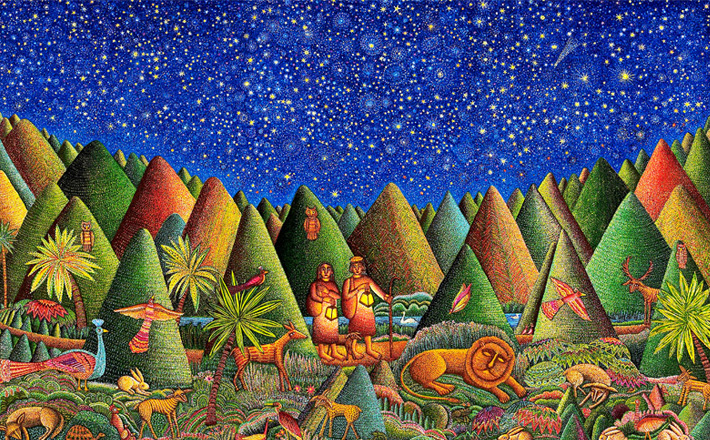Commentary on Isaiah 5:1-7; 11:1-5
This lectionary reading combines two familiar texts.
The Vineyard Song of Isaiah 5:1-7 lures the audience into bringing judgment on itself for its failure to produce justice and righteousness, while the messianic hymn of Isaiah 11:1-5 envisions a new David establishing justice because he has been endowed with the divine spirit of wisdom and discernment. Both texts employ metaphors drawn from the plant world, and although the metaphor switches from the care of a vineyard in chapter 5 to the regeneration of a tree in chapter 11, both texts are rooted, so to speak, in agrarian wisdom: Even plants and trees that are brutally cut down can grow again. They also raise the question of whether and how it is possible for human communities to fulfill God’s expectation of justice and righteousness.
The Song of the Vineyard in Isaiah 5:1-7 revolves around an elaborately developed metaphor of a love song about a vineyard. We first hear of the vintner’s expectations from the prophet-singer, who claims that this is his love song about his beloved. It becomes clear in the course of the poem that the singer’s beloved is YHWH, the vintner who so carefully prepares the fertile field to produce good grapes.
The song also implicitly conveys the prophet’s desire for the vineyard’s well-being. The poem thus sets up an interesting triangle of relationships, where the audience is encouraged to identify not only with the vintner but also with the poet, both of whom are deeply attached to this vineyard on whom the vintner has lavished such care and attention.
Running like a refrain throughout this short song is the repeated declaration that God expected one thing but got another (verses 2, 4, 7). The verb “expect” (qavah) is closely related to the noun “hope” (tikveh); to expect is to live in hope of a future outcome. The poem’s agrarian imagery makes this hope entirely reasonable. For societies attuned to seasons of planting and harvest, it is natural to expect choice stock planted in well-cultivated fertile ground to produce good fruit. “Plant a radish, get a radish,” sing two fathers in the off-Broadway musical The Fantasticks. You can count on a plant to realize its genetic destiny. But these same fathers then admit that “child-eren” are “bewilderin,” and “you never know what you’ve got ’til they’re grown.”1 YHWH’s question to the people of Jerusalem and Judah expresses a similar bewilderment: “What more was there to do for my vineyard that I have not done in it?” (verse 4).
The vintner’s expectation is brutally dashed in the poem’s final verse. Not only do we learn that the vineyard is the house of Israel and Judah, we also learn just how they have defied God’s hope. As Joseph Blenkinsopp has noted, the word pair “justice and righteousness” conveys a vision of a just social order “in which the rights of all, including the most marginalized—the destitute, orphans, and widows (Isaiah 1:17, 21-23; 11:4-5)—are respected.”2 Isaiah’s wordplay in this line delivers a devastating critique. Where God looked for justice (mishpat), there was bloodshed (mispeh) and instead of righteousness (tsedekah), there was outcry (tsa’aqah). The wordplay is impossible to convey in English; suffice it to say that the resulting harvest is not simply poor or inadequate, it is evil.
Metaphors encourage thought. By putting two dissimilar things together, it becomes possible to see familiar things in a new way. So it is worth asking what this metaphor is asking its audience to see and understand.
First, what does it add to our understanding of God to imagine God as hopeful, not knowing the outcome of divine labor and care? More particularly, what do we begin to see about God’s work in the world, when we see that God hopes not just for the salvation of individual souls but for the establishment of a just society?
Second, how do we begin to think about human nature when we compare it to more predictable features of the plant and animal world? At the very least, the metaphor suggests it is the destiny of human nature to produce just societies. Within the confines of the metaphor, any other outcome defies imagination. Consequently God turns to the audience and complains, “What more was there to do for my vineyard that I have not done in it?” (Isaiah 5:4). Within the rules of this particular metaphor, there is in fact nothing more to do, and so the vintner declares he will tear down all his work and allow the vineyard to revert to a wasteland overrun with briers and thorns.
But questions like these also have a way of pointing to puzzles requiring other solutions.
By employing a different metaphor from the plant world, Isaiah 11 envisions a different relationship between God and the human agent of justice, and consequently a different outcome. Rather than envisioning the gardener having the last word, this metaphor envisions the possibility of beginning again even after devastating destruction.
The stump of Jesse both alludes to the House of David and evokes the image of YHWH’s total destruction of Israel and Judah that was announced at the end of Isaiah’s call: “Even if a tenth part remain in it, it will be burned again, like a terebinth or an oak whose stump remains standing when it is felled” (Isaiah 6:13).
There is no direct connection to the vineyard metaphor of Isaiah 5; however, the metaphor of the stump producing new life posits another outcome to divine judgment. Irrepressibly, Jesse’s stump produces a new shoot, a new David who fulfills God’s expectation of justice and righteousness. He does not do this naturally, however, as if it is in his DNA to be just. Once the plant metaphor introduces the possibility of beginning afresh, the poem leaves metaphor behind and speaks more explicitly of the king being endowed with God’s spirit of wisdom and understanding, counsel and might, knowledge and the fear of the Lord—proper reverence (11:2-3).
Radishes can be counted on to be radishes, but human beings need something more to realize their proper destiny. What Isaiah 11 introduces into the human project, then, is grace, and for Isaiah, what grace equips human nature to do is to fulfill its destiny of establishing justice and righteousness.
Notes:
- Harvey Schmidt, Julian Stein, and Tom Jones, The Fantasticks, 50th Anniversary ed. (Van Nuys, Ca.: Alfred Music Publishing, 2010).
- Joseph Blenkinsopp, Isaiah 1-39 (AB 19; New Haven: Yale University Press, 2000), 108.
PRAYER OF THE DAY
Loving Lord, you have searched your people for evidence of goodness, the way fruit is sought in a vineyard. Send your righteous judge and find goodness in your faithful children. Amen.
HYMNS
Immortal, invisible, God only wise ELW 834, GG 12, H82 423, NCH 1, UMH 103
God extends an invitation ELW 486
CHORAL
I am the true vine, Peter Aston


November 17, 2019